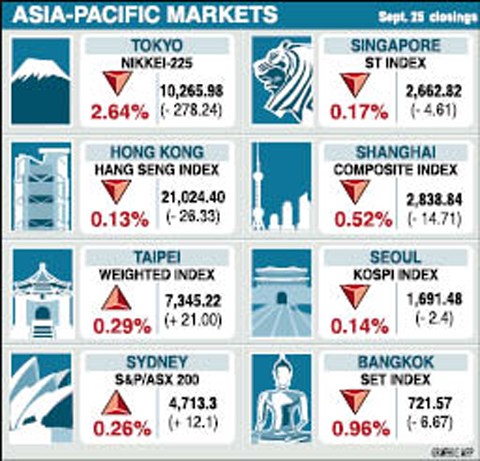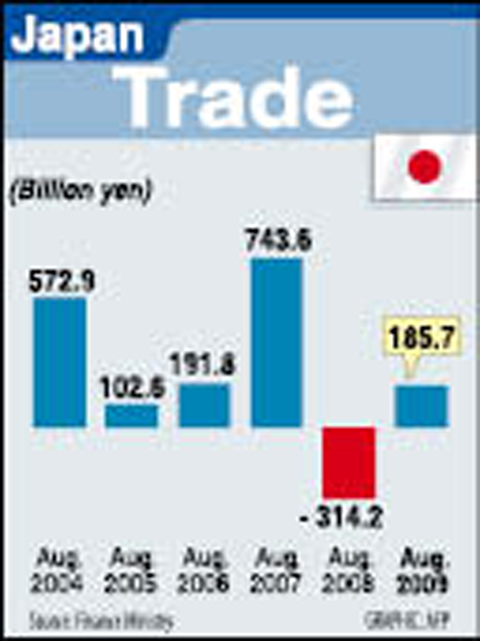Asian stocks declined for the first time in three weeks as commodities prices slumped and companies took advantage of the recent rally to sell new shares.
Aluminum Corp of China (中國鋁業), China’s biggest producer of the metal, slumped 8 percent in Hong Kong. BHP Billiton Ltd, the world’s largest miner, fell 3 percent. Nomura Holdings Inc, Japan’s biggest brokerage, slumped 17 percent after announcing a record US$5.6 billion share sale. Guoyuan Securities Co (國元證券) slumped 11 percent after regulators approved its plan to sell additional equity.
“I wouldn’t be surprised if we’d seen the peak of the market for this year because the economic news isn’t going to improve very much,” investor Marc Faber, the publisher of the Gloom, Boom & Doom report, said in an interview with Bloomberg Television on Friday. “The correction in the market has been overdue for quite some time.”

The MSCI Asia-Pacific Index dropped 0.5 percent this week to 117.77. Asian markets have rallied 67 percent since the MSCI benchmark dropped to a five-year low on March 9.
Japan’s Nikkei 225 Stock Average fell 1 percent, while China’s benchmark Shanghai Composite Index tumbled 4.2 percent for the region’s steepest decline. Vietnam, Thailand and Indonesia were among markets that posted gains this week.
Taiwanese share prices are expected to see buying from local institutional investors in an attempt to dress up their books with the quarter coming to an end next week, dealers said on Friday.

However, the upside room is limited as the market moves closer to a strong resistance level at around 7,500 points, they said.
For the week to Friday, the weighted index fell 181.33 points, or 2.41 percent, to 7,345.22, after a 2.58 percent increase a week earlier.
Average daily turnover stood at NT$109.74 billion (US$3.39 billion), compared with NT$116.70 billion the previous week.
“I do not have high hopes about local institutional buying as the interest is expected to focus on small and mid-cap stocks on low valuations instead of large-sized counterparts,” Grand Cathay Securities Corp (大華證券) analyst Mars Hsu said.
Other markets on Friday:
HONG KONG: Down 0.13 percent. The Hang Seng Index lost 26.33 points at 21,024.40.
“Concerns the US Federal Reserve will scale back some of its supportive measures for the economy will weigh on the local market in the near term,” Ernie Hon, strategist at ICBC International Securities told Dow Jones Newswires.
SHANGHAI: Down 0.52 percent. The Shanghai Composite Index, which covers both A and B shares, was down 14.71 points to 2,838.84.
“The fall in large-caps and sharply shrinking turnover shows investors’ sentiment remains very weak and the market has no momentum to go upward in the near term,” said Zhou Lin, an analyst at Huatai Securities.
SEOUL: Down 0.14 percent. The KOSPI lost 2.4 points to close at 1,691.48.
SINGAPORE: Down 0.17 percent. The Straits Times Index fell 4.61 points to 2,662.82.
BANGKOK: Down 0.96 percent. The Stock Exchange of Thailand fell 6.97 points to close at 721.57.
KUALA LUMPUR: Flat. The Kuala Lumpur Composite Index lost 0.67 points to close at 1,217.39
JAKARTA: Down 0.98 percent. The Jakarta Composite Index lost 24.32 points to 2,444.58.
MANILA: Down 0.56 percent. The composite index fell 16.00 points to 2,821.34.
“The US markets are down and its probably also a reaction to the import figures,” for July, Paul Balaoing of PCCI Securities Brokers said.
“Everyone was expecting that by this time, import figures would have improved,” he said.
MUMBAI: Down 0.53 percent. The 30-share SENSEX index fell 88.43 points to 16,693.

AIR SUPPORT: The Ministry of National Defense thanked the US for the delivery, adding that it was an indicator of the White House’s commitment to the Taiwan Relations Act Deputy Minister of National Defense Po Horng-huei (柏鴻輝) and Representative to the US Alexander Yui on Friday attended a delivery ceremony for the first of Taiwan’s long-awaited 66 F-16C/D Block 70 jets at a Lockheed Martin Corp factory in Greenville, South Carolina. “We are so proud to be the global home of the F-16 and to support Taiwan’s air defense capabilities,” US Representative William Timmons wrote on X, alongside a photograph of Taiwanese and US officials at the event. The F-16C/D Block 70 jets Taiwan ordered have the same capabilities as aircraft that had been upgraded to F-16Vs. The batch of Lockheed Martin

GRIDLOCK: The National Fire Agency’s Special Search and Rescue team is on standby to travel to the countries to help out with the rescue effort A powerful earthquake rocked Myanmar and neighboring Thailand yesterday, killing at least three people in Bangkok and burying dozens when a high-rise building under construction collapsed. Footage shared on social media from Myanmar’s second-largest city showed widespread destruction, raising fears that many were trapped under the rubble or killed. The magnitude 7.7 earthquake, with an epicenter near Mandalay in Myanmar, struck at midday and was followed by a strong magnitude 6.4 aftershock. The extent of death, injury and destruction — especially in Myanmar, which is embroiled in a civil war and where information is tightly controlled at the best of times —

China's military today said it began joint army, navy and rocket force exercises around Taiwan to "serve as a stern warning and powerful deterrent against Taiwanese independence," calling President William Lai (賴清德) a "parasite." The exercises come after Lai called Beijing a "foreign hostile force" last month. More than 10 Chinese military ships approached close to Taiwan's 24 nautical mile (44.4km) contiguous zone this morning and Taiwan sent its own warships to respond, two senior Taiwanese officials said. Taiwan has not yet detected any live fire by the Chinese military so far, one of the officials said. The drills took place after US Secretary

THUGGISH BEHAVIOR: Encouraging people to report independence supporters is another intimidation tactic that threatens cross-strait peace, the state department said China setting up an online system for reporting “Taiwanese independence” advocates is an “irresponsible and reprehensible” act, a US government spokesperson said on Friday. “China’s call for private individuals to report on alleged ‘persecution or suppression’ by supposed ‘Taiwan independence henchmen and accomplices’ is irresponsible and reprehensible,” an unnamed US Department of State spokesperson told the Central News Agency in an e-mail. The move is part of Beijing’s “intimidation campaign” against Taiwan and its supporters, and is “threatening free speech around the world, destabilizing the Indo-Pacific region, and deliberately eroding the cross-strait status quo,” the spokesperson said. The Chinese Communist Party’s “threats